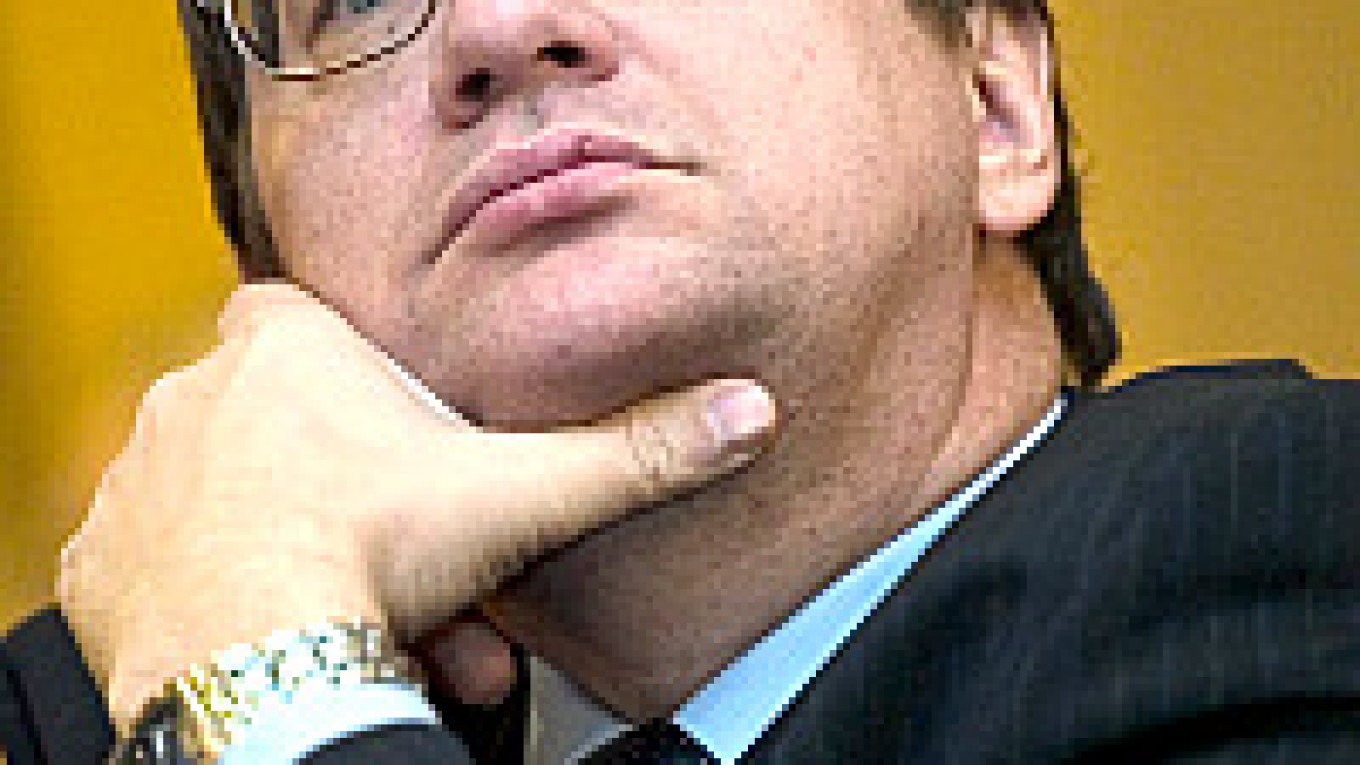Fyodorov had suffered a stroke several weeks ago and was being treated at a London clinic at the time of his death, UFG said in a statement.
An outspoken free-market reformer who served as finance minister in the government of Prime Minister Yegor Gaidar from 1993 to 1994, Fyodorov was one of the original implementers of the shock therapy reforms of the 1990s.
He held various government posts in the 1990s, including deputy prime minister, head of the Federal Tax Service and State Duma deputy from 1994 to 1998.
"He was one of the brightest financial experts in Russia," said Boris Nemtsov, who as deputy prime minister worked with Fyodorov in 1997 and 1998.
"He was an unusual guy who always stood by his point of view," Nemtsov said by telephone.
In 1994, Fyodorov founded UFG, one of the country's first investment banks, together with Harvard-educated banker Charles Ryan. UFG was bought by Deutsche Bank in 2005 and transformed into the bank's Russian unit.
At the time of his death, Fyodorov served on the boards of several companies, including Gazprom, Sberbank and Ingosstrakh.
Born in Moscow on Feb. 13, 1958, Fyodorov graduated from the Moscow Finance Institute in 1980 and entered government service as a currency economist at the State Bank of the Soviet Union.
In 1990, he became the first finance minister of the Russian Soviet Republic, advising Mikhail Gorbachev's Politburo on economic reforms.
Soon after, Fyodorov gained fame when he developed the financial portion of Grigory Yavlinsky's ill-fated "500 days" plan, the first Soviet program for shifting the economy to market principles.
"Few people thought about developing financial markets and creating financial mechanisms in Russia in the early 1990s," UFG said in the statement. "Even in the hardest times, Boris Grigoryevich did not lose faith in Russia's economic potential."
As the 35-year-old finance minister of the newly formed Russian Federation, Fyodorov was often outspoken in his criticism. When Strobe Talbott, then the U.S. ambassador-at-large to the former Soviet Union, commented that Russia might need "less shock and more therapy" after a strong showing by anti-reform parties in the 1993 parliamentary elections, Fyodorov accused the United States of undermining the position of the reformist ministers.
"I think Talbott was out of line," Fyodorov said at the time. "He actually stabbed us in the back."
Despite serving in a variety of government positions, Fyodorov maintained that he disliked political life and preferred working as an economist. "Politics is a drug that I could get out of my system and go back to being an economist, which I can do better," he told Vedomosti in 2006.
His UFG private equity fund owns shares in various gold-mining and travel concerns, as well as an almost 50 percent stake in the tabloid Zhizn, which it purchased for $40 million in 2006.
Fyodorov served on Gazprom's board from 2000. He was an advocate of better management at the company, which in the 1990s was embroiled in internal disputes and accused of corruption, and urged the company's executives to do whatever was necessary to bring up its share price.
"The most accurate yardstick for private investors to judge management is a company's share price and market capitalization — and Gazprom has failed to measure up," he wrote in a 2004 commentary in The Moscow Times.
UFG developed a derivative that allowed foreigners to own stock in Gazprom, despite state regulations restricting foreigners from holding shares in state-owned companies.
President Dmitry Medvedev, who formerly served as Gazprom chairman, offered his condolences Thursday, RIA-Novosti reported.
Fyodorov was also the author of some 200 books, including "A Chronicle of the Destruction of Old Moscow, 1990-2005," which contains a detailed list of 650 buildings that have disappeared from Moscow in the past 15 years.
He said he funded the book out of his own pocket because he had fond memories of his childhood in the historic Ostozhenka district of central Moscow and wanted to express his disgust at the city's changing architecture.
Fyodorov said in a 2004 interview that he had purchased land where he wanted to keep animals and hold an archeological dig. "I am an odd person," he said.
Fyodorv is survived by his wife, Olga, and two children, the youngest of whom is 5.
Funeral arrangements were not immediately available. Fyodorov will be buried in Moscow, RIA-Novosti reported.
A Message from The Moscow Times:
Dear readers,
We are facing unprecedented challenges. Russia's Prosecutor General's Office has designated The Moscow Times as an "undesirable" organization, criminalizing our work and putting our staff at risk of prosecution. This follows our earlier unjust labeling as a "foreign agent."
These actions are direct attempts to silence independent journalism in Russia. The authorities claim our work "discredits the decisions of the Russian leadership." We see things differently: we strive to provide accurate, unbiased reporting on Russia.
We, the journalists of The Moscow Times, refuse to be silenced. But to continue our work, we need your help.
Your support, no matter how small, makes a world of difference. If you can, please support us monthly starting from just $2. It's quick to set up, and every contribution makes a significant impact.
By supporting The Moscow Times, you're defending open, independent journalism in the face of repression. Thank you for standing with us.
Remind me later.


